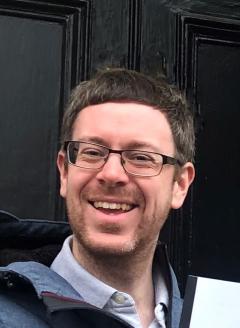Stuart Dunbar's 2020 reflections
Despite the fact that festivals have been unable to go ahead this year in their usual form, the university has still been able to produce a fantastic amount of events. Stuart Dunbar contributed to our collection of reflections illustrating some of the ways the University of Edinburgh has supported cultural life in the city this year.

- Please tell us about yourself and your role at The University of Edinburgh?
I work as the Engagement Manager within the University’s College of Science and Engineering, which means that I support staff and students with their public engagement ideas (anything from a talk through to research collaboration with external groups and individuals), as well as coordinate College-level public engagement plans, mainly events such as Doors Open Day at the King’s Buildings.
- Had 2020 been a standard year, what work would you have traditionally been working on with regards to the city’s festivals?
My main interest for Edinburgh’s Festivals relates mostly (but not completely exclusively!) to the Edinburgh Science Festival. In 2020, I was project managing our Family Programme that was planned to take place in the National Museum of Scotland during the Easter break (March/April). This free programme would have involved students and staff from across a wide variety of subjects delivering hands-on experiences and dedicated workshops for a range of visitors over the course of two weeks.
- How did that change for you in the wake of the Covid-19 Pandemic?
Two weeks prior to the Edinburgh Science Festival, the festival organisers took the extremely difficult decision to cancel the in-person programme that everyone had been working so hard to put together for a number of months. This was a choice that we completely understood and supported. The festival organisers then ambitiously attempted – with a week’s notice – to develop a completely online programme that provided an avenue through which we could still engage.
This shift required an enormous amount of coordination work within difficult circumstances, but as an institution we rose to the challenge fantastically. Our contributions to the Elements at #EdSciFest programme are still available online and have resulted in thousands of ‘visitors’.
- What have been your observations of working during lockdown?
Personally, it has been reasonably straightforward to do my job from a home office, except for the delivery of in-person events of course... The broad take-up of online communication tools has made it easy to develop ideas with colleagues and understand the difficulties they are experiencing, which has informed my priorities for what supportive measures need to be developed. Of course, the benefits of chance catch-ups when walking around campus have disappeared, so it has not been all positive!
- Have the projects you have been working on surprised you in any way?

The Doors Open Day at The King’s Buildings (DODatKB) project has been brilliant. It is impossible to do events in the same way as before lockdown right now, and so we were not able to deliver DODatKB and its combination of interactive activities and behind-the-scenes access in the same way. However, my colleagues were really inventive in the online resources they provided and together we have developed a tour experience of which I am incredibly proud. We now have an online experience that can provide some sort of access to our King’s Buildings campus for a longer duration than the usual single-day event and we will be building on this in future years, even when in-person events are realistically possible again. In fact, it will be part of the Midlothian Science Festival, Dundee Science Festival, and Explorathon(part of European Researchers’ Night).
- What else have you learnt from this situation?
That digital inequalities of young people are more readily noticed than inequalities related to physical spaces. There has rightly been a national focus on the negative impact of home learning for children and young people who live within socio-economically challenged circumstances. This has raised important questions about whether we should do things online if some people cannot access the things we are offering. However, this mindset assumes that in-person events suffer no such issues, which is far from the case – there is growing research highlighting how some people will never go to a museum for example, so therefore they will not attend an event there. Also, online events may help actually extend the geographical reach in comparison with a physical event. In sum, there are advantages and disadvantages to whichever approach is chosen.
Therefore, I hope that once lockdown conditions have passed, we – as a broad engagement community in the University (and across the UK for that matter) – continue to reflect on the platforms we use to engage (both online and offline), so that we continue to improve our attempts to engage all sectors of society.
- And looking forward?
Returning to the Edinburgh Science Festival, we are already deep into discussions around what could be possible for 2021. We are assuming there will be a move away from large, indoor events and instead there will be a focus on online activities (both on-demand and live) as well as events in outdoor spaces instead. This shift could offer exciting opportunities to host activities throughout the city and reach new communities. We continue to learn about developing engaging activities and events within our current circumstances, and it will be fantastic to deliver high-quality experiences in collaboration with the Edinburgh Science Festival organisers.

